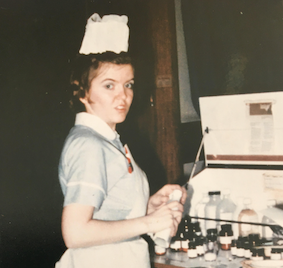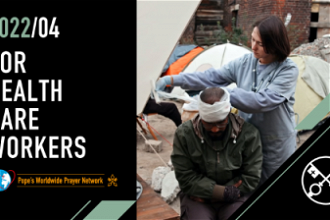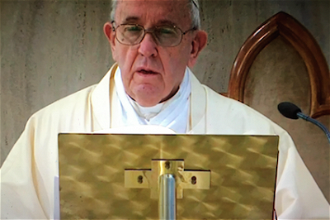Nurse reflects on 200th birthday of Florence Nightingale

Nurse Jo on night duty, January 1972, picture taken by a patient
This week in happier times, I, together with nurses and midwives throughout the world, would have been celebrating the 200th birthday of Florence Nightingale. Throughout the year there were global events planned, international conferences, visits to Florence, a garden at the Chelsea Flower Show and a lot of parties. But the best that seems to be happening is that the pop up hospitals have been named Nightingales.
Just over 50 years ago I entered the Nightingale Training School at St Thomas Hospital to start the journey to becoming a qualified nurse. I had wanted to be a nurse since I was a small child, I always saw it as a vocation. I went to St Thomas' because of the connection with Florence Nightingale whose life I had avidly studied as a child. When I joined the hospital I was following my vocation, my call to be a nurse, there was no doubt that that was what I wanted to do. When I chose nursing it was not seen as a professional career, there were certainly people around me, not my family, who suggested I could do better for myself. Florence Nightingale recognised that she had a call from God, and despite opposition from her parents she persisted until they allowed her to follow that call.
Florence Nightingale knew her nursing vocation was a call from God. And St Thomas' Hospital was a Christian foundation founded at the south side of London Bridge to serve the pilgrims returning from Canterbury. So there was a strong Christian ethos in the place. On each ward morning and evening the ward sister knelt at her desk in the middle of the ward and said prayers, while her staff knelt at the door, partly to prevent any people from entering at that time, but also including the whole ward in the prayer.. It was a powerful expression of the ethos of the place we worked in.
In 2010 I visited Istanbul with a group of fellow Nightingales. We visited Scutari where the military hospital was based. It is still a Turkish military barracks, but we were allowed to see some of the areas connected with Florence Nightingale. We had taken the prayers we used on the wards when we were students. And the authorities very kindly allowed us to use them. It was quite moving saying the prayers we remembered from St Thomas' in Florence Nightingale's tiny room in the corner of this barracks.
Following her time in the Crimea, Florence Nightingale set up er school of nursing which trained me and many others at St Thomas' Hospital. Her legacy was the backbone of all our teaching. Even the design of the hospital with the Nightingale wards all dated back to her plans. Florence Nightingale's strict high diktats were constantly quoted to us as students,We were aware that her high standards were being passed on to us. Her 'notes on nursing' is still in print today and still has advice which remains relevant in any nursing situation today. Our aim, as young students, was to become a Nightingale, and be given a Nightingale badge. An achievement we greatly prized and still do, once a Nightingale, always a Nightingale, even 50 years later.
As a Catholic at this strongly Church of England hospital, I was told once I would never make a ward sister! Relatively recently meeting a young Muslim nurse at the hospital I related that story. Her reaction was one of astonishment. In my day the patients came from Lambeth and were mostly Church of England, although we were taught how to cater for patients of all faiths. We were all familiar with the chapel, a beautiful Victorian place in the centre of the hospital where it remains to this day. As a Catholic, although I was told I would probably never be appointed as a ward sister, I never had any problems. And in fact, unusually for those times we had Mass each Sunday in the chapel.
The yearly Nativity tableau in the chapel with a new baby in the crib was a regular feature, with a group of us making up a small choir at the back. Even now each year when we celebrate Florence Nightingale's birthday we have a service in the chapel, which is very well attended and then there follows a tea party. There is always a sense of returning to the chapel to give thanks for her, the training we had, and for nurses and nursing today
We were hugely proud of being at St Thomas' and we were even prouder when we became Nightingales. Florence Nightingale is still honoured throughout the world. Her influence on nursing touched so many places. In the early days her trained nurses were sent out to hospitals everywhere. I discovered a plaque in the Sydney docks area to a Nightingale nurse who was sent out to re-organise the hospital there in the nineteenth century. You still find Nightingales all over the world, and it is always an instant link when we meet. Now there is an International Nurses' Day near Florence Nightingale's birthday each year, and this year 2020, two hundred years after her birth has been designated the year of the Nurse and Midwife. I am prouder of being a Nightingale more now that ever
Sadly all the wonderful celebrations marking her bicentenary this year have been cancelled. But perhaps the respect for nurses and other workers in the NHS which the present crisis has generated will lead to a renewed respect for the legacy of Florence Nightingale the founder of modern nursing.


















